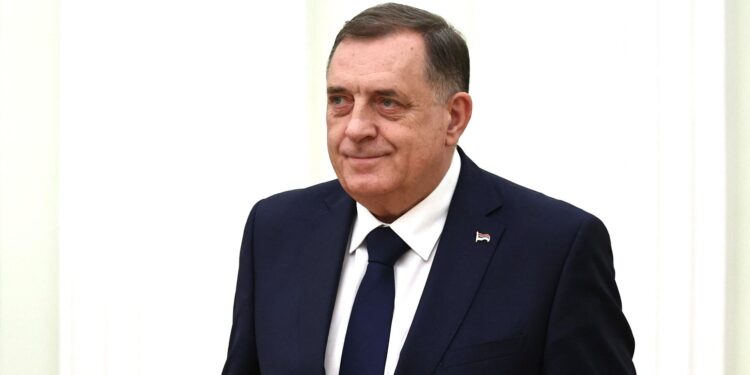In a significant shift in rhetoric, Milorad Dodik, the Serb member of Bosnia and Herzegovina’s tripartite presidency, has indicated that Republika Srpska will no longer pursue secession from the country. Speaking to Gazeta Express, Dodik appeared to soften his longstanding stance on independence, signaling a potential de-escalation of tensions in the ethnically divided nation. This development marks a notable departure from previous calls for separation and could have substantial implications for the region’s fragile political landscape.
Dodik Changes Stance on Republika Srpska Secession
Milorad Dodik, the prominent Bosnian Serb leader, has notably softened his previous hardline rhetoric regarding the political status of Republika Srpska (RS). In recent statements, Dodik acknowledged the complex legal and international frameworks that prevent RS from unilaterally declaring independence from Bosnia and Herzegovina. This shift reflects a pragmatic approach amidst growing regional and international pressure for stability.
Dodik emphasized several key points underscoring the limitations that Republika Srpska faces:
- Constitutional constraints embedded in the Dayton Agreement that structure Bosnia and Herzegovina’s governance.
- International diplomatic resistance to any secessionist initiatives in the Balkans.
- Economic and political risks associated with pursuing unilateral secession.
| Aspect | Previous Position | Current Stance |
|---|---|---|
| Secession | Firmly supported | Now deemed unfeasible |
| International Relations | Challenging international norms | Prioritizing diplomatic engagement |
| Internal Stability | Potential destabilization | Aiming for political balance |
Political Implications for Bosnia and Herzegovina’s Stability
The recent statement by Milorad Dodik marks a significant shift in the political landscape of Bosnia and Herzegovina, providing a much-needed respite amid escalating ethnic tensions. By publicly acknowledging that Republika Srpska cannot legally pursue secession, Dodik has potentially opened a door for renewed dialogue within the complex framework of the Dayton Agreement. This move is being interpreted by analysts as a strategic effort to stabilize the country’s fragile political equilibrium, while defusing international concerns surrounding the territorial integrity of Bosnia and Herzegovina.
Key implications of this development include:
- Reduction in nationalist rhetoric: A softer stance from one of the most influential Serb leaders could ease inter-ethnic hostilities.
- Enhanced prospects for EU integration: Compliance with constitutional boundaries may improve Bosnia’s eligibility for accession talks.
- Increased international confidence: Diplomatic partners may view this as commitment to peace and cooperation within the state.
| Political Factor | Impact |
|---|---|
| Dodik’s statement | Eases secession fears |
| Ethnic relations | Potential normalization |
| EU integration prospects | Improved cooperation |
Experts Urge Dialogue and Constitutional Reforms to Address Ethnic Divides
Leading analysts and constitutional experts emphasize that durable peace and stability in Bosnia and Herzegovina hinge on open dialogue between all ethnic groups and comprehensive constitutional reforms. They argue that the current political structure, though designed for post-conflict power-sharing, has entrenched divisions that obstruct effective governance and social cohesion. Instead of unilateral moves toward independence, a collaborative re-examination of the Dayton Agreement framework is essential to ensure equal representation and rights for Bosniaks, Croats, and Serbs.
Key recommendations put forward include:
- Establishment of a multi-ethnic constitutional commission to foster inclusivity
- Reform of electoral laws to prevent ethnic polarization
- Creation of mechanisms that promote cross-community economic development
- Strengthening of state-level institutions to build trust among citizens
| Reform Area | Objective | Expected Impact |
|---|---|---|
| Constitutional Amendments | Enhance representation and minority rights | Greater ethnic harmony and political stability |
| Electoral System | Promote fair elections beyond ethnic lines | Reduced ethnic block voting |
| Economic Cooperation | Joint investment in infrastructure | Improved livelihoods and social integration |
In Retrospect
As the political landscape in Bosnia and Herzegovina continues to evolve, Milorad Dodik’s recent admission marks a notable shift in the rhetoric surrounding Republika Srpska’s future. While longstanding tensions persist, this softened stance may open new avenues for dialogue and stability within the country. Observers will be watching closely to see how this development influences both internal dynamics and the broader regional balance moving forward.
















